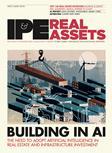Allocations from Japan’s defined benefit pension funds to real assets have hit record levels, according to JP Morgan Asset Management.
The 12th annual survey of the ¥60trn (€507bn) industry shows that corporate pension funds have turned to real assets – predominantly real estate and infrastructure – for high returns and stable incomes as they shift en-masse away from negative-yielding Japanese government bonds.
Among the 116 Japanese corporate pension schemes and mutual aid schemes surveyed, allocations to alternatives were found to have exceeded 20%, ahead of government bonds.
For the first time in the history of the survey, average allocations to domestic government bonds had dropped to 18.1% – down from 30.3% in 2015.
Allocations to alternatives, meanwhile, have risen steadily over the past five years, from 12.8% in 2015.
Akira Kunikyo, investment specialist at JP Morgan Asset Management, said the average Japanese pension fund now allocated 21.3% of its portfolio to alternatives, including illiquid assets such as real estate and infrastructure.
“The driving force behind this shift is the current low-interest-rate environment,” Kunikyo told 91��ý����.
The yield on 5-year and 10-year Japanese government bonds are -0.25% and -0.16%, respectively. Five-year bond yields have been in negative territory since 2017.
Kaguya Komatsu, managing director and head of Japan institutional business at JP Morgan Asset Management, told 91��ý���� that the government’s motive in lowering the yield on domestic bonds was to encourage investors to put their money into Japan’s real economy.
Komatsu said corporate pension funds had historically been heavily invested in government bonds but were now seeking to introduce “a sufficient level of asset diversification” into their portfolios, including moving away domestic debt investments.
The survey found that a number of pension funds were already allocating 40% or more of their portfolios to alternatives.
Kunikyo said heightened interest, specifically in real estate and infrastructure, suggested that institutional investors were turning to alternatives not just for higher potential returns and diversification but also for stable income.
The survey found that more respondents – almost 40% – now indicated their intention to continue to increase exposure to alternatives versus traditional asset classes.
Within alternatives, allocations to insurance-linkd securities, private equity and private debt were all down from previous surveys.
Target returns among Japanese pension funds have fallen gradually in recent years, reaching 2.28% by the end of March 2019, according to the survey.
With the government bond market suffering from increasingly negative yields, corporate pension funds have reduced their return expectations to around 2% for the next few years.











